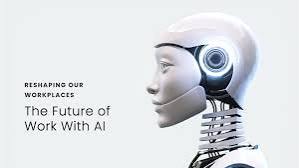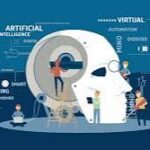The Rise of Artificial Intelligence: How It’s Shaping the Future of Work

Artificial Intelligence (AI) is no longer a concept confined to science fiction; it’s an integral part of our daily lives and rapidly transforming industries worldwide. From healthcare and finance to manufacturing and customer service, AI is revolutionizing the way we work. But how exactly is AI reshaping the future of work, and what does this mean for employees, businesses, and society at large?
This article explores the rise of AI, its impact on various sectors, the challenges it brings, and how individuals and organizations can adapt to this transformative technology.
What is Artificial Intelligence?
Artificial Intelligence refers to the development of computer systems capable of performing tasks that typically require human intelligence. These tasks include learning, reasoning, problem-solving, and decision-making. AI encompasses various subfields such as:
- Machine Learning (ML): Algorithms that allow systems to learn from data and improve over time.
- Natural Language Processing (NLP): The ability of machines to understand and interpret human language.
- Computer Vision: AI’s ability to interpret and analyze visual data.
- Robotics: Machines designed to perform physical tasks autonomously.
AI’s Role in the Workplace
1. Automation of Repetitive Tasks
One of AI’s most significant contributions is automating mundane, repetitive tasks. In industries like manufacturing, AI-powered robots handle assembly lines with precision and efficiency. Similarly, in administrative roles, AI automates data entry, scheduling, and other routine processes.
Impact:
- Increases productivity and efficiency.
- Allows employees to focus on creative and strategic work.
- Reduces operational costs for businesses.
2. Enhanced Decision-Making
AI systems analyze vast amounts of data in real-time, providing insights that help businesses make informed decisions. For instance, predictive analytics can identify market trends, customer preferences, and potential risks.
Examples:
- Financial institutions use AI for fraud detection and investment strategies.
- Retailers leverage AI to optimize inventory and predict customer demand.
3. Personalized Customer Experiences
AI-powered chatbots and virtual assistants are transforming customer service by offering personalized, 24/7 support. These tools use natural language processing to understand customer queries and provide accurate responses.
Benefits:
- Improves customer satisfaction.
- Reduces response times.
- Frees up human agents to handle complex issues.
4. Upskilling and Training
AI is also reshaping employee training and development. Adaptive learning platforms use AI to create personalized training programs based on an individual’s strengths and weaknesses.
Impact:
- Accelerates skill acquisition.
- Prepares employees for evolving job roles.
- Fosters a culture of continuous learning.
Industries Being Transformed by AI
1. Healthcare
AI is revolutionizing healthcare by improving diagnostics, streamlining administrative tasks, and enabling personalized medicine. For example, AI-powered algorithms can analyze medical images to detect diseases like cancer earlier and more accurately than human doctors.
2. Finance
AI plays a pivotal role in fraud detection, credit scoring, and algorithmic trading. It enhances efficiency and minimizes risks by analyzing financial data in real-time.
3. Manufacturing
Smart factories use AI to optimize production processes, monitor equipment, and predict maintenance needs. This reduces downtime and increases productivity.
4. Education
AI-driven learning platforms provide personalized education experiences, helping students learn at their own pace. Virtual tutors and automated grading systems are also becoming commonplace.
5. Retail
AI is transforming the retail experience through personalized recommendations, dynamic pricing, and inventory management. AI tools also enhance the e-commerce experience with features like visual search and virtual try-ons.
Challenges of AI in the Workplace
While AI offers numerous benefits, it also presents challenges that need to be addressed:
1. Job Displacement
Automation powered by AI has the potential to replace certain job roles, particularly those involving repetitive tasks. For instance, roles in data entry, manufacturing, and customer service may face redundancy.
Solution:
- Governments and businesses must invest in reskilling and upskilling initiatives to prepare the workforce for AI-driven roles.
2. Ethical Concerns
AI systems can unintentionally perpetuate biases present in their training data. For example, biased hiring algorithms may unfairly discriminate against certain groups.
Solution:
- Developers must prioritize transparency and fairness when designing AI systems.
- Companies should implement robust ethical guidelines for AI use.
3. Privacy and Security
AI’s reliance on data raises concerns about privacy and cybersecurity. Unauthorized access to sensitive information could lead to significant breaches.
Solution:
- Implement stringent data protection measures.
- Comply with privacy regulations such as GDPR and CCPA.
How to Adapt to an AI-Driven Workplace
1. Embrace Lifelong Learning
As AI continues to evolve, staying relevant requires a commitment to lifelong learning. Focus on developing skills that complement AI, such as critical thinking, creativity, and emotional intelligence.
2. Develop Technical Skills
Gaining proficiency in AI-related fields like machine learning, data analytics, and programming can open new career opportunities. Numerous online platforms offer courses on these topics.
3. Cultivate Soft Skills
While AI excels at technical tasks, soft skills like leadership, communication, and problem-solving remain uniquely human. Strengthening these skills will make you invaluable in an AI-driven workplace.
4. Stay Informed
Keep up with the latest developments in AI and how they impact your industry. Understanding trends will help you adapt proactively.
The Future of Work with AI
The rise of AI is not about replacing humans but augmenting their abilities. By automating repetitive tasks and providing powerful insights, AI enables employees to focus on innovation, creativity, and strategic decision-making. However, the key to harnessing AI’s potential lies in collaboration—humans and machines working together to achieve greater results.
What Does This Mean for Society?
- Redefinition of Jobs: New roles will emerge, such as AI trainers, data ethicists, and machine learning specialists.
- Improved Work-Life Balance: Automation can reduce workloads, allowing for more flexibility and leisure time.
- Increased Global Connectivity: AI will facilitate seamless collaboration across borders, creating a truly interconnected workforce.
Conclusion
Artificial Intelligence is undeniably shaping the future of work, offering unprecedented opportunities for innovation and growth. While challenges exist, they can be addressed through ethical practices, continuous learning, and proactive adaptation.
By embracing AI as a tool for progress rather than fearing it as a threat, individuals and organizations can thrive in this transformative era. The future of work is here, and with the right mindset and preparation, it holds immense potential for a brighter, more efficient world.


